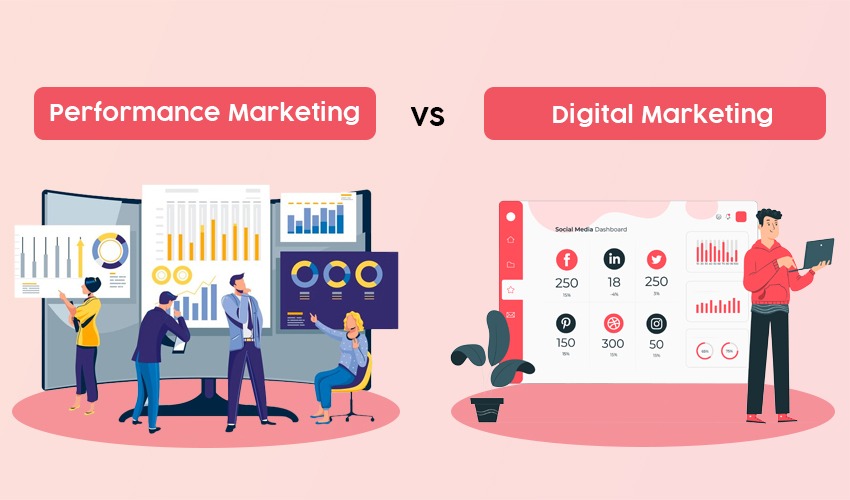We hear digital marketing everywhere. Actually, there are numerous sorts of digital marketing, and their outlets and capacities are developing daily. One ignored digital marketing tactic is performance marketing. In performance marketing, marketers only pay for particular activities. A viewer clicks over to their website or buys.
This article explores performance and digital marketing: how it works, why you should use it, and which channels are most cost-effective.
Many people use “performance marketing” and “digital marketing” interchangeably, although they are different. Digital marketing includes branding and awareness, whereas performance marketing focuses on leads and sales.
- The measurement of success distinguishes performance marketing from digital marketing. Performance marketing measures outcomes using CPA and ROI. Digital marketing, which builds consumer connections and awareness, is harder to quantify.
- Implementation distinguishes performance marketing from digital marketing. Performance marketing strategies usually target a certain audience or purpose. Digital marketing is more broad and focuses on brand exposure and audience reach.
- Data and analytics are shared by performance and digital marketing. Both techniques employ data to pick target populations, ad types, and the best channels. Performance marketing is more data-driven, focusing on campaign optimization and outcomes.
- The campaign goals will determine whether to use performance or digital marketing. Performance marketing may be ideal for organizations seeking leads or sales. Digital marketing may be better for brand recognition and consumer interactions.
Performance marketing and digital marketing have different aims and objectives despite their similarities. Understanding the distinctions between the two may help organizations pick the appropriate method for their requirements and get the greatest outcomes.
Read Also: Why Brands Can’t Ignore Digital Marketing for Promotion
Performance Marketing:
Results-driven digital marketing is performance marketing. It’s perfect for firms trying to increase their audience since payment is dependent on content engagement.
- Performance marketing involves businesses paying service providers only after meeting business goals or particular activities, such as a click, sale, or lead. This is performance-based marketing.
- Performance marketing works when marketers partner with Digital Marketing Agency or publishers to develop and put ads on social media, search engines, videos, embedded online content, and more. These marketers pay based on clicks, impressions, shares, or sales rather than standard advertising rates.
Digital Marketing:
Digital marketing promotes a product or service through digital means. This strategy connects clients online, where they spend most of their time searching for information or pleasure.
- Digital marketing is wide since there are various internet venues. Social media, email, and blogging are digital marketing.
- Promotional material on these sites makes a unified online marketing plan. Digital marketing is crucial for event marketing and email subscriber lists.
Key Differences Between Digital and Performance Marketing
Marketing trends and approaches in the fast-paced sector are essential for business success. Common terms include performance and digital marketing. Though similar, they differ in ways that may affect your marketing. This article covers goals, targeting, money allocation, ROI measurement, advertising channels, ad creatives, and how to choose the right strategy for your business.
Determine objectives:
- Marketing Performance: Performance marketing works fast. Quantifiable goals include lead generation, sales, and conversions. Performance marketers aim for maximum ROI.
- Digital marketing grows: It includes performance marketing, brand awareness, customer involvement, and long-term connections. Digital marketers desire internet prominence and audience trust.
Target Audience:
- Using data and analytics, performance marketing targets high-converting audiences. Retargeting and PPC are used to reach potential customers at the right time.
- Data-driven digital marketing segmented audiences beyond conversions. To grow its audience and client base, it uses content marketing and social media.
Budgeting:
- Performance marketing budgets are more flexible. The marketing budget depends on campaign and channel performance. High-ROI channels may receive more money.
- Digital marketing budgets are more extensive. It funds brand strategy-based channels and initiatives, even if some have a longer ROI realization timetable.
ROI Quantification:
- Easy ROI calculation for marketing performance. Marketers may immediately connect conversions to campaigns or activities to calculate ROI. Important indicators are CPC and CPA.
- Digital marketing ROI is tougher to calculate. Brand recognition, social media engagement, and conversion are evaluated. Many touchpoint contributions are evaluated using attribution modeling.
Routes to Advertise:
- Performance marketing uses Google Ads, Facebook Ads, and affiliate marketing. This channel is used for fast conversions.
- Content, social media, email, SEO services, events, and PR are digital marketing channels. These sites provide a comprehensive online presence.
Ads and Content:
- Performance marketing ads and content are action-oriented. CTAs are clear and persuasive. Instant audience action is desired.
- Digital marketing requires educational, engaging, and interesting content. Detailed information may build industry confidence and authority.
Choose the Right Approach:
Our performance or digital marketing strategy depends on our goals, industry, and audience. Consider these to decide:
If you need speedy sales or conversions, try performance marketing.
- Digital marketing boosts brand awareness, online presence, and customer loyalty.
- Combine both for a complete marketing approach.
- Check your campaign performance and adjust your approach to optimize marketing.
Key Benefits of Performance vs. Digital Marketing
Digital marketing sees a broader marketing landscape. Branding, customer relationships, and online presence matter. Although slower than performance marketing, the long-term benefits may be greater.
Company goals and the audience decide the best approach. Good marketing plans mix short-term gains and long-term growth with performance and digital marketing. Choose a marketing plan based on your objectives and business needs.
Performance Marketing Benefits:
1. Clear ROI Tracking: Performance marketing lets you measure campaign performance.
2. Instant Results: Performance marketing may provide rapid conversions.
3. Spend strategically on high-performing campaigns.
4. Data analysis informs performance marketing decisions and improvement.
Digital Marketing Advantages:
1. Branding: Digital marketing helps build brand awareness and an online presence for long-term success.
2. Customer Engagement: Social media and engaging content link audiences.
3. Diversified Channel Use: Digital marketing allows several audience communication channels.
4. Growth Over Time: Digital marketing may expand and retain customers despite delayed results.
Conclusion:
Digital and performance marketing are linked. Used appropriately, both strategies are helpful. Companies seeking fast ROI should use performance marketing. The fast, data-driven tool boosts conversions and ad expenditure efficiency.

